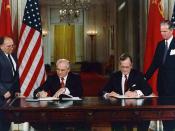How significant an impact have Gorbachev's glasnost and perestroika policies had on Russian society?
INTRODUCTION
In 1985 Mikhail Gorbachev became the General Secretary of the Communist Party of the Soviet Union - in effect, the political leader of the USSR. He inherited an economy in dire need of development and restructuring: both its industrial and its agricultural output were waning, and, internationally, it was falling further behind the growing capitalist economies of its Cold War competitors, North America and Western Europe. To combat this crippling burden on Soviet society Gorbachev determined to pursue a risky yet potentially rewarding policy of restructuring of Soviet industry based on the introduction of a new openness in Soviet society. This essay examines Gorbachev's policies and their implications for Russian society. Specifically, it analyses the aims of perestroika - what Gorbachev intended - and its outcome - certainly not what he intended, and which left the once popular Communist leader reviled at home yet lauded abroad as the man who brought an end to the Cold War.
The essay concludes that, comparatively, the linked policies of perestroika and glasnost were "one of those major and rare historical changes that will influence the course of mankind henceforth"�.
AIMS
The two policies of glasnost and perestroika were indissolubly connected. Glasnost was the Soviet policy of openness and transparency undertaken in the mid-1980s. It aided the distribution of once secretive information and permitted, and in reality encouraged, honesty in examining the trials, tribulations and failures of Soviet society. Glasnost also demanded increased consultation in the administration and running of the USSR, and was utilized by Gorbachev to attack corruption among the ruling Communists of the Soviet regime and to curb the censorship that was a underlying feature of Communist rule. Brown labelled glasnost "a facilitating concept"...


